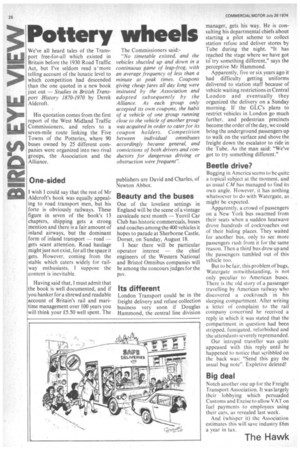Pottery wheels
Page 30

If you've noticed an error in this article please click here to report it so we can fix it.
We've all heard tales of the Transport free-for-all which existed in Britain before the 1930 Road Traffic Act, but I've seldom read amore telling account of the lunatic level to which competition had descended than the one quoted in a new book just out — Studies in British Transport History 1870-1970 by Derek Aldcroft.
His quotation comes from the first report of the West Midland Traffic Commissioners, and refers to a seven-mile route linking the Five Towns of the Potteries, where 90 buses owned by 25 different companies were organized into two rival groups, the Association and the Alliance. The Commissioners said: "No timetable existed, and the vehicles shuttled up and down in a continuous game of leapfrog, with an average frequency of less than a minute at peak times. Coupons giving cheap fares all day long were insituted by the Association and adopted subsequently by the Alliance. As each group only accepted its own coupons, the habit of a vehicle of one group running close to the vehicle of another group was acquired in order to cater for its coupon holders. Competition between individual omnibuses accordingly became general, and convictions of both drivers and conductors for dangerous driving or obstruction were frequent".
One-sided
I wish I could say that the rest of Mr Aldcroft's book was equally appealing to road transport men, but his forte is obviously railways. These figure in seven of the book's 13 chapters, shipping gets a strong mention and there is a fair amount of inland airways, but the dominant form of inland transport — road — gets scant attention. Road haulage might just not exist, for all the space it gets. However, coming from the stable which caters widely for railway enthusiasts. I suppose the content is inevitable.
Having said that, I must admit that the book is well documented, and if you hanker for a shrewd and readable account of Britain's rail and maritime management over 100 years you will think your 0.50 well spent. The publishers are David and Charles, of Newton Abbot.
Beauty and the buses
One of the loveliest settings in England will be the scene of a vintage cavalcade next month — Yeovil Car Club has historic commercials, buses and coaches among the 400 vehicles it hopes to patade at Sherborne Castle, Dorset, on Sunday, August 18.
I hear there will be particular operator interest — the chief engineers of the Western National and Bristol Omnibus companies will be among the concours judges for the psv.
Its different
London Transport could be in the freight delivery and refuse collection business very soon if Douglas Hammond, the central line division manager, gets his way. He is consulting his departmental chiefs about starting a pilot scheme to collect station refuse and deliver stores by Tube during the night. "It has reached the stage where we have got to try something different," says the perceptive Mr Hammond.
Apparently, five or six years ago it had difficulty getting uniforms delivered to station staff because of vehicle waiting restrictions in Central London and eventually they organized the delivery on a Sunday morning. If the GLC's plans to restrict vehicles in London go much further, and pedestrian precincts become the order of the day, we could bring the underground passengers up to walk on the surface and shove the freight down the escalator to ride in the Tube. As the man said: "We've got to try something different."
Beetle drive?
Bugging in America seems to be,quite a topical subject at the moment, and as usual CM has managed to find its own angle. However, it has nothing whatsoever to do with Watergate, as might be expected.
Apparently, a crowd of passengers on a New York bus swarmed from their seats when a sudden heatwave drove hundreds of cockroaches out of their hiding places. They waited for another bus, only, to see more passengers rush from it for the same reason. Then a third bus drew up and the passengers tumbled out of this vehicle too.
But to be fair, this problem of bugs, Watergate notwithstanding, is not only peculiar to American buses. There is the old story of a passenger travelling by American railway who discovered a cockroach in his sleeping compartment. After writing a letter of complaint to the rail company concerned he received a reply in which it was stated that the compartment in question had been stripped, fumigated. refurbished and the attendants severely repremanded.
Our intrepid traveller was quite appeased with this reply until he happened to notice that scribbled on the back was: "Send this guy the usual bug note". Expletive deleted!
Big deal
Notch another one up for the Freight Transport Association. It was largely their lobbying which persuaded Customs and Excise to allow VAT on fuel payments to employees using their cars, as revealed last week.
And (whisper it) the Association estimates this willsave industry ibm a year in tax.
The Hawk
































































































